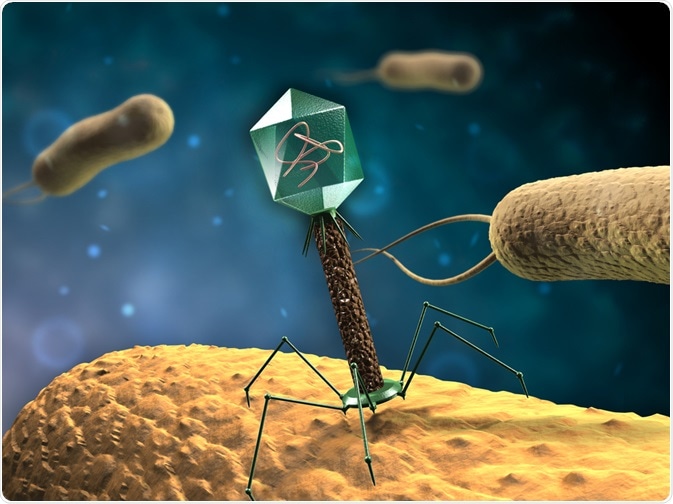Bacteriophages are a type of virus which infect bacterial cells and are abundant in nature. Temperate bacteriophages display a lysogenic life cycle, which requires them to integrate their viral genome into the bacterial chromosome. This is in contrast to virulent bacteriophages, which immediately produce progeny and lyse the host cell.
 Andrea Danti | Shutterstock
Andrea Danti | Shutterstock
What are bacteriophages?
Bacteriophages are viruses that infect and replicate within bacterial hosts. The bacteriophages infect the host bacterium by binding to specific cell surface receptors on the bacteria and injecting their genome into the cytoplasm. Viruses that replicate using only the lytic cycle are known as virulent bacteriophages, and viruses that replicate using both lysogenic and lytic cycles are known as temperate bacteriophages.
The bacteriophage genes encode for the structural head and tail proteins of the virus, as well as the lytic enzymes that cause lysis of the bacteria.
What is the lysogenic life cycle?
The lysogenic cycle is one of the two cycles of viral reproduction which involves integration of the bacteriophage nucleic acids into the host bacterium genome, creating a prophage. The bacterium continues to live and reproduce normally via common prokaryotic reproduction, and the genetic material within the prophage is transmitted to the daughter cells of the bacteria.
What is the lytic life cycle?
For temperate bacteriophages, the introduction of certain events (e.g. UV radiation) that may damage or kill the host cell, stimulates transcription of the viral DNA (prophage) and production of progeny phage.
Lytic enzymes are synthesized when the bacterium has produced a sufficient number of new virions. This bursts the host cell, releasing the newly synthesized bacteriophages into the surrounding environment. The lytic life cycle results in multiple copies of the virus before the original cell is destroyed.
Manipulation of the lysogenic life cycle
Entry into the lytic or the lysogenic cycle is controlled by the lysis-lysogeny transcriptional switch. This switch activates the prophage, resulting in viral replication, host cell lysis, and the release of viral progeny. In a study performed on the Lactobacillus casei bacteriophage (A2), it was found that the lytic cycle is regulated by the A2 Cro protein (a product of the phage operator region), which represses the transcription of the immunity repressor genes, allowing the lytic promoter to be expressed.
Cro binds to specific DNA segments and bends it to regulate transcription. There are three distinct DNA regions where Cro can bind and function as a genetic switch. This governs the entry of the phage into the lysogenic or lytic cycles.
What effects do temperate bacteriophages have on bacteria?
Bacterial infection and antimicrobial resistance
Lysogenic conversion involves the infection of a bacterium by a bacteriophage and the expression of the bacteriophage genes that are in the prophage. This affects the phenotype of the infected bacterium. Prophages may contain regions of DNA not involved in viral replication but benefit their bacterial host. These regions are referred to as ‘morons’ and are expressed in the lysogenic cycle. Morons include genes that directly or indirectly enhance the virulence and pathology of the bacterial host.
Streptococcus pneumonia temperate bacteriophage (MM1) directly contributes to drug resistance. MM1 codes for the CI protein which is involved in maintaining the lysogenic state in S. pneumonia. MM1 also affects lytA-encoded autolysin expression, which is involved in the pathogenesis of pneumococcal infection of S. pneumonia.
Bacterial evolution
Bacteriophages contribute to bacterial diversity by affecting the evolution and adaptation of their hosts. Temperate bacteriophages achieve by changing DNA by genome disruption, duplication, and transduction. More information is required regarding the relationship between bacteriophages and bacteria that will aid medicine and various life science fields.
Further Reading
Last Updated: Jan 24, 2019